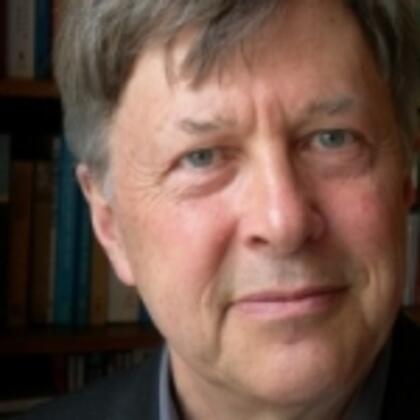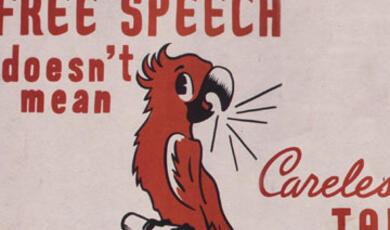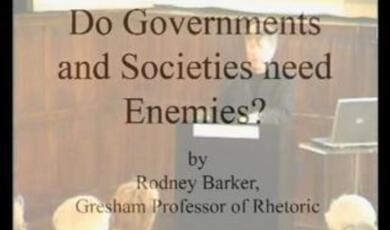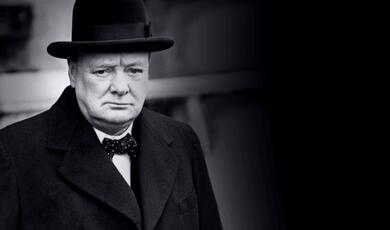Other Britains: One size doesn’t fit all
Share
- Details
- Text
- Audio
- Downloads
- Extra Reading
Not all political thinking is about either individual liberty and as little government as possible, or a responsible, or leadership, or housekeeping style of government. Alternative forms of government, society and politics: small groups, communities, localities, and voluntary associations. The varied forms of pluralism: socialist, communist, conservative and liberal.
Download Text
Professor Rodney Barker
Not all political thinking is about either individual liberty and as little government as possible, or a responsible, or leadership, or housekeeping style of government. Alternative forms of government, society and politics: small groups, communities, localities, and voluntary associations. The varied forms of pluralism: socialist, communist, conservative and liberal.
1* PICTURE
1. One size fits all
Those who promote a political doctrine or ideology usually apply it to everyone. After all, if all that someone was talking about was a personal preference, it would be liking choosing a book to read or a film to watch, and wouldn't affect or involve anyone else. It would be an individual, personal choice, not a political one.
It's only when the personal choice becomes something more, a belief that the book you choose to read, or not to read, is so important or so subversive or wicked that everyone ought to read it, or be prevented from reading it, that personal choice is replaced by political ideology.
Our accounts of how we might live, once they become political and not simply personal, inevitably involve others as supporting actors in the script we choose to write.
But as soon as the political ideology is set down, there will be those who will and can say 'That doesn't actually fit my situation' Political ideas invite parallel or alternative ideas, 'that's not how WE do things'
The traditional choice in political ideology had been between state and individual, the national whole and the single person fragment. Much of the argument, not only between, but within, the major ideologies, seemed to range between deciding what was properly the concern of the whole of society and therefore, at least potentially, of government and of politics, and what was properly a matter for individual choice.
It is an old distinction, whether in terms of render unto Caesar the things that are Caesar's and unto God the things that are God's, or in Queen Elizabeth the First's (limited) drawing a boundary to state power when she declared that she did not wish 'to make windows into men's souls'
In this view, and it was the view which predominated for both the short and the long twentieth centuries, politics and government, whatever problems they dealt with or did not deal with, were about general solutions for the whole of society.
Differences of opinion existed both about at what point the boundary was to be drawn between state and individual, and in relation to what. Those who believed that the state should regulate religion did not necessarily believe it had any place regulating the quality of housing, and those who believed it should take responsibility for the distribution of income did not necessarily believe it had any role in the control of newspapers or books.
But in relation to the aspects of life which people did believe were within the responsibility of the state rather than of the individual, they believed the state's responsibility extended to everyone. If you did believe that books should be censored, they should be censored for all. If you believed that education should be compulsory, then everyone should go to school.
It was a view of government which, in relation to law, had been expressed by the constitutional lawyer A. V. Dicey, writing in 1885 in part of his description of the rule of law which he defined as 'the idea of legal equality, or of the universal subjection of all classes to one law':
'every man, whatever be his rank or condition, is subject to the ordinary law of the realm'
2. Tailor made
But there was another way of seeing things, another ideal of public and social life, and it illustrates the instability, or dynamism depending on your point of view, of any ideology: the alternative way is pluralism
Those who are described as pluralists do not in any sense constitute a group, except to the outside observer. They are in that sense a taxonomic group, as are humans, or butterflies, but not a doctrinal one.
But what they share is an assumption that people live most of their lives neither as isolated individuals, nor as uniform members of the whole national mass, but as members of various groups, associations, professions, or organisations. In any one country there will be many such groups, and any individual is likely to be associated with more than one: social life, in other words, is made up neither of atomised individuals nor of one huge uniform mass of people, but of a plurality of different groups and different identities.
Hence the title 'pluralism'
And of course, because ideologists who think in this way emphasise difference and variety, they are themselves characterised by difference and variety. There is a plurality of pluralisms.
The principal 4 groups which pluralists have seen as important have been:
2* PICTURE
i Churches and religious groups
ii Households and domestic communities
iii Occupational groups, trades, professions
iv Decentralised politics: local government and community
{v AND, but with qualifications as the 20th century ends, culture & ethnicity}
Concern for this dimension of social life developed in the first quarter of the chronological twentieth just as most ideologists were talking more and more in terms of state and nation on the one hand and individual on the other, with apparently less and less room for anything in between.
But it was precisely those years which were the high point of pluralism as a reaction against the very big and all encompassing, and the very small, atomised, individual and isolated.
Pluralists arguments and pluralist accounts of the human world were there in the early years of the twentieth century, but faded rather into the background after the First World War, and without entirely disappearing, were not much heard of again until the end of the short Twentieth Century, the years after the end of the Cold War, the collapse of Eastern European and Russian Communist regimes, and the tearing up of the old ideological maps.
Pluralism was like the streams in limestone country which sink below ground, and reappear miles further on, or like the recessive genes whose effects skip a generation, giving fair or dark hair, or blue or brown eyes to children not from their parents, but from their grandparents. If genes can be recessive, so can ideologies, and pluralism has been a recessive ideological theme which has jumped the generations, and emerged again in the last years of the 20th century
1. Churches and religious groups
At the start of the Twentieth Century Britain had, as it has now at least in England and Scotland, an established church which is associated with the government, an association which gives it an authority, or a claim to authority, for the whole religious life of the nation.
This is in continuation of a doctrine which emerged during the reformation and its aftermath of cuius regio, eius religio. What was good for the ruler was good for the people. This was formally expressed in England, and still is, by the formal role of the monarch as Supreme Governor of the Church of England.
Resistance to the idea of religious uniformity was there from the beginning. But it is important to distinguish between the arguments of those who wanted an established and uniform religion, but wanted a different one, and those who wanted to pursue their religious life in a particular way not allowed by uniformity, but did not want everyone else to follow suit or be forced to follow suit.
So the first examples of religious pluralism are not those who disputed over religion in the Seventeenth Century during the civil wars, but those who demanded no more than to be able to worship in their own way, and not to be penalised for doing so. The history of religion and the state from the Reformation onwards is a slow, unsteady, but generally progressive move first to allow dissenters - Quakers, Baptists and other small groups - to worship as they chose, and then to remove the barriers to public life which had initially prevented those not in communion with the Church of England from entering the universities.
But by the beginning of the Twentieth Century, what had been an argument against the alliance of the state and the Church of England by those of other faiths or none, became an argument within the Church of England for its independence from political control or entanglement.
So that now, as we approached Christmas 2008, an Archbishop of Canterbury could tell a left wing journal that it would not be the end of the world if the Chuch of England lost it's link with the British state, and that a church without such official connections would have a 'certain integrity'
But the argument is almost a century older than this:
In a series of writings before the First World War and in particular in his 1913 book Churches in the Modern State, the Anglican priest J. N. Figgis argued for independence for his church. And this was part of, and justified by, a larger pluralist argument, that individuals' identities were created out of the groups to which they belonged.
His argument was not about communities which entirely absorb the whole identity of their members, but a pick and mix about the varieties of social identity
This was an important distinction between what the term multiculturalism is often used to mean, and pluralism.
Multiculturalism can be used to mean that there are a number of distinct and complete cultures, and that people are members of those cultures or communities in a way which if it does not define their whole identity, sets the agenda for it. It is a view which makes it possible to say that someone is transgressing the rules of 'their' culture or in losing contact with 'their' identity or cultural roots.
Pluralism in the way that Figgis is using the argument is quite different. Nobody could transgress the rules of 'their' culture in his sense, because the only 'culture' which could be described as 'theirs' is their own individual pick and mix.
For Figgis a person was not a component of a group, but an individual whose individuality was formed from the various groups with which he or she was associated.
The varieties of identity, and the varieties of association, which Figgis saw as constituting the social life of the people meant that government had a general role in relation to all its people, but no responsibility or right in relation to any particular aspect of identity, religious or secular.
'the State did not create the family, nor did it create the Churches ; nor even in any real sense can it be said to have created the club or the trades union; . . . they have all arisen out of the natural associative instincts of mankind, and should all be treated by the supreme authority as having a life original and guaranteed'
This is a view which has developed interestingly in recent times:
3* PICTURE
2. Households and domestic communities
The second kind of association for which claims were made and arguments put against both simple individualism and one size fits all state provision or regulation, was the family and household. In one sense there was nothing novel or radical in this. It had always been a strand within conservative, with a small c, argument to see the family, particular the male headed family with dependent spouse and children, as simply state authority writ small, and divine authority writ even smaller, not an alternative to a general, uniform governed society, but a component of it.
But it was possible to argue for the importance of households in a different way, and to do so against those, of whatever ideology, who saw things in broad uniform terms.
The earliest twentieth century example of this is a book by the journalistHilaire Belloc written in 1912, The Servile State .
The Servile State refuses to fit into any obvious ideological box, and is particularly interesting for that reason.
Belloc argued that capitalism was unstable, because it could not fulfil the expectations of equality raised by its liberal values. The social realities of the economy, and the legal realities of the political order, were in conflict, the one making for inequality, the other for equality.
Three possible outcomes: Socialism
Slavery
Property (distributism)
Socialism: well-meaning but ill considered,. Socialism in fact impossible. Ownership by officials, since the people as whole could not own the economy.
But socialists lacked the ruthless courage of their convictions, and would never expropriate
Slavery; cf Spencer, and Hayek
Because socialist would not destroy capitalism, they would end up collaborating with it, regulating and making provision for the work force
Labour under compulsion in return for material benefits in kind.
An alliance of state and capital
Property. Self sufficiency, households, a-industrial, patriarchy
Belloc presented his arguments as a simple impartial description of possibilities, but his own preferences and his own expectations were clear enough
Belloc, too, constructed his arguments in precisely the pick and mix original way that marked off pluralism, and which also meant that even though pluralists might be described with a single title, no two of them were ever likely to agree.
Sometimes seen as a socialist, because he was an anti-capitalist - and hedid want to give property to the people.
Sometimes seen as a conservative because he valued property for the specific way of life it could support.
Sometimes seen as a liberal because he valued both property and equality.
But equally disconcerting for all three:
Socialists, because he placed the principal value on individual property, giving it directly to the people
Viz debate with McDonald
Conservatives because, valuing property, he proposed more people should have it, and that there be some kind of public intervention to do this
Liberals, because he questioned the beneficence of an unregulated economy to produce the benefits which liberal choice promised.
Belloc's case illustrates too how rough and ready any attempt to categorise ideologies is.
Distributism never really went anywhere, and couldn't anyway be applied to the industrial side of the economy - it would take a idealistic fanatic to imagine that something like the railways could be broken up into lots of and lots of little bits and still work -
But the arguments of Belloc were in part taken up in all kinds of strange and different places, in the economic liberal anti-socialist arguments of F A Hayek at the end of the Second World War, and by guild socialist advocates of workers' control during the First.
Pluralism, like all ideologies, is neither neat nor self-contained, and this may even be especially true of pluralism.
3a. Occupational groups, work as art:
Commune-ism: William Morris
4* PICTURE
Distributism wasn't the only pluralist argument to refuse to fall neatly into any of the big ideological hold alls. The pluralism of occupational groups, is equally difficult to fit into conventional slots, however much they might cluster to the left or the right, towards socialism or conservatism.
Occupational pluralism has been of two broad kinds, though even to say that is to simplify quite strongly: there is a pluralism which is interested in the nature of work, the possibilities of creativity, and degree to which control over what you do is not just convenient or rewarding, but life enhancing. And there are the various forms of workers' control, usually in relation to modern industry.
Probably the best example of the first is William Morris. William Morris was a polymath: poet, novelist, designer, printer, craftsman, political thinker who set out an alternative to mass homogeneous industrial society, most notably in his 1890 utopian fantasy News from Nowhere. What mattered for Morris were the small communities and households centred around creative work. His utopian fantasy described a London, and an England, transformed into a series of loosely associated neighbourhoods where people worked in the way that artists and dedicated professionals were privileged to work - for their own satisfaction, for the pleasure of producing worthwhile goods or services, and in control of their own time and activity.
As with anarchism, all other forms of pluralist or group theory can stand in a flexible position not only with regard to the state but with regard to what is conventionally regarded as politics.
As described by Morris it was hardly a political ideology at all.
Morris epitomises this a-political politics amongst socialists. Not so much an opposition to the state as such, but a view of the ultimate goals of life both individual and social which had no place for the state and little for conventional politics.
5* PICTURE
At every point Morris's work leads away from the conventionally political as anything but a temporary instrument, if that, to the informal, un-coerced relations of individuals within small groups, the artistic satisfaction of creative work, the realisation of art in everyday life.
And like Figgis and Belloc, his were arguments, advocacies, aspirations, which fell out of the ideological market place for much of the twentieth century but, like streams in limestone country, re-emerged just as vigorously at the end of it.
3b. Occupational groups in industrial society:
Morris's aspiration, like Belloc's, had been utopian, and for its realisation would have depended on a pre-, post-, or non-industrial society.
If the direct, immediate, and particular control over their life and work, particularly their work, which Belloc and Morris had called for, was to be feasible in an industrial society, it would have to be by some form of workers' co-operatives or worker's control.
There were three principal advocates of such a strategy in the Twentieth Century: the historian and social scientist G D H Cole, the historian R H Tawney, and the political scientist Harold Laski
Just as pluralism in general was a reaction against the domination of political argument by the two extremes of state and individual, so arguments for workers' control were a reaction against the top-down, managerial uniformity of both existing capitalism and proposed socialism
The academic historian and student of politics G. D. H. Cole argued for a revision of representative democracy so that the existing parliament would be paralleled by a national assembly representing industrial groups - industries, rather than trades, unlike the existing trades union system.
It was a fairly modest form of pluralism, giving a less uniform character to the existing national state, rather than proposing any kind of alternative to it. It certainly didn't propose forms of social life which were in some way separate from the central state.
The arguments of his contemporary, the economic historian and socialist R. H. Tawney, were in many ways more radical. The nub of Tawney's argument was set out in a short pamphlet published in 1920, The Sickness of an Acquisitive Society. It's a book whose title tells you quite a lot about what is inside. This isn't just a dry political pamphlet, but a moralistic, slightly puritan, attack on a life, and a society, devoted in considerable part to the acquisition of material goods.
For Tawney, as it had been for Morris, the proper purpose of work was a mixture of personal satisfaction and social or public service. All work could and should have the character which, in their highest form, the professions had: a task responsibly carried out by people who took pride in what they did and were directly in control of it. Power and responsibility went together
When the argument was republished the following year, The Sickeness ofwas dropped from the title. But the point was still clear: acquisitiveness wasn't an economic activity, it was a vice.
The third contributor to the arguments for workers' control was the political scientist Harold Laski. In a series of books - Laski frequently wrote several books a year - Laski argued that workers' control in some form was appropriate under any form of state, and the conventional solution of democratic state socialism was one he rejected as just as bad as the pre-socialist, capitalist system.
'For to surrender to government officials not merely political but also industrial administration is to create a bureaucracy more powerful than the world has ever seen?
Laski in particular made the link between the ways of working taken for granted by the professional middle class, and the possible ways in which the work of the majority of the population could be changed.
Ethos and principles which characterised the professions should, argued Laski, be applied to all production. 'Just as the rules of a profession are made, subject to the will of society, by those engaged therein, so must the rules of industry be made by the working force of industry.'
4. Local government has not aroused passions and enthusiasms
Local issues can often seem to be mainly about licensing and Leylandi. But the argument that human life is particular and diverse goes well with the support for local discretion, and local politics can provide a forum for those who are sceptical of both state and nation on the one hand, and isolated individualism on the other.
5. Culture and ethnicity
It's a mark of the move away from the ideological map of the short twentieth century that both culture and religion, categories of identity rather than of property, are moving to the foreground.
But there are important differences between the kinds of pluralist arguments which are being taken up again, and which stress variety and a pick'n'mix approach to identity, and some at least of the arguments over culture and ethnicity.
In 2000, the Runnymede Trust published a report on The Future of Multi-Ethnic Britain. It spoke about the importance of giving proper recognition to communities, and to the representatives of communities.
But communities, unlike groups or associations, are or can be all encompassing. To be a member of a community is to have, or risk having, every aspect of your identity already spoken for.
Communities, unlike groups, risk being less pluralist because morecomprehensive. In that sense advocates of multi-culturalism who are talking about communities, are advocating something which is potentially all-embracing, rather than about groups, which each provide only a part of a person's identity
Whilst economic differences between groups can be negotiated, and compromise is the nature of things, identity clashes between communities are not necessarily so easy. Markets and altars give rather different outcomes.
But if a working arrangement is to be found for a society of diverse character, pluralism seems to offer possibilities which a rigid multi-culturalism does not.
It is a mark of how far we are moving from the working assumptions of the twentieth century, either long or short, that we have to look elsewhere for solutions, to the pluralism of the twentieth century to address the dangers of the 21st.
7* PICTURE
Pluralism provides no easy answers, and carries its own problems and instabilities.
On the one hand, if groups are important, they are so because they enable people to flourish. And that leads back to solitary individualism.
On the other hand if groups are important, the larger group, society as a whole and its cultivator and guardian the state, is even more so.
Pluralism always pulls in two directions, towards the individual, and towards the group
But all ideologies contain inconsistencies and tensions, there is no final resting place, and that is what makes for continual dynamism, innovation, argument, and choice
If all the answers to all the questions were known, it might be feasible to provide a government and a society of one size fits all. But until that rather unlikely day, pluralism offers the best chance of making sense of a human life which is varied, changing and dynamic.
When Humphrey Lyttelton was asked what the future of Jazz would be he replied that if he knew that, he'd be playing it.
If we knew the future of Jazz, there would be nothing to look forward to, and if we knew the future and character of all human political and social life, history, and pretty much everything else, would have come to an end.
©Professor Rodney Barker, Gresham College, 21 January 2009
This event was on Tue, 13 Jan 2009
Support Gresham
Gresham College has offered an outstanding education to the public free of charge for over 400 years. Today, Gresham College plays an important role in fostering a love of learning and a greater understanding of ourselves and the world around us. Your donation will help to widen our reach and to broaden our audience, allowing more people to benefit from a high-quality education from some of the brightest minds.


 Login
Login







